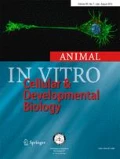Summary
We have investigated the response of several epithelial and fibroblastic cells to a mitogenic extract of bovine milk. Cation exchange chromatography was used to produce a mitogen-rich fraction from an industrial whey source that, although comprising only 0.5% of total whey protein, contained the bulk of the growth factor activity. This fraction was a source of potent growth promoting activity for all mesodermal-derived cells tested, including human skin and embryonic lung fibroblasts, Balb/c 3T3 fibroblasts, and rat L6 myoblasts. Maximal growth of all these cell types exceeded that observed in 10% fetal bovine serum. Feline kidney and baby hamster fibroblasts and Chinese hamster ovary cells were less responsive, achieving a maximal growth response of 50–75% that observed in 10% fetal bovine serum. Maximal growth achieved in whey-extract-supplemented cultures of Balb/c 3T3 and human skin fibroblasts, and L6 myoblast cultures exceeded that seen in response to recombinant acidic or basic fibroblast growth factor, platelet-derived growth factor, insulin-like growth factor, or epidermal growth factor. Importantly, addition of low concentrations of fetal bovine serum to the whey-derived mitogenic fraction produced an additive response. However, concentrated milk-derived factors were found to be inhibitory to the growth of all epithelial lines tested, including rat intestinal epithelial cells, canine kidney epithelial cells, and mink lung cells. It is concluded that industrial whey extracted in this form constitutes an important source of potent growth-promoting agents for the supplementation of mesodermal-derived cell cultures.
Similar content being viewed by others
References
Cox, D. A.; Bürk, R. R. Isolation and characterisation of milk growth factor, a transforming-growth-factor-β2-related polypeptide, from bovine milk. Eur. J. Biochem. 197:353–358; 1991.
Damerdji, O.; Derouiche, F.; Legrand, C., et al. Utilization of whey fractions as a substitute for fetal calf serum in culture media. Biotechnol. Tech. 2(4):253–258; 1988.
Derouiche, A. F.; Legrand, C.; Bour, J. M., et al. Biochemical aspects of a whey fraction capable of promoting hybridoma proliferation: Comparison with fetal calf serum. Lait 70:313–324; 1990.
Electricwala, A.; Clark, S.; Griffiths, J. B., et al. Tissue plasminogen activator production from cells cultured in milk extract. Fibrinolysis 6:51–55; 1992.
Francis, G. L.; Upton, F. M.; Ballard, F. J., et al. Insulin-like growth factors 1 and 2 in bovine colostrum: Sequences and biological activities compared with those of a potent truncated form. Biochem. J. 251:95–103; 1988.
Francis, G. L.; Regester, G. O.; Webb, H. A., et al. Extraction from cheese whey by cation exchange chromatography of factors that stimulate the growth of mammalian cells. J. Dairy Sci. in press.
Hodgson, J. Fetal bovine serum revisited. Bio/Technology 11:49–53; 1993.
Ichiba, H.; Kusuda, S.; Itagane, Y., et al. Measurement of growth promoting activity in human milk using a fetal small intestinal cell line. Biol. Neonate 61:47–53; 1992.
Klagsbrun, M. Human milk stimulates DNA synthesis and cellular proliferation in cultured fibroblasts. Proc. Natl. Acad. Sci. USA 75(10):5057–5061; 1978.
Klagsbrun, M. Bovine colostrum supports the serum-free proliferation of epithelial cells but not of fibroblasts in long-term culture. J. Cell Biol. 84:808–814; 1980.
Klagsbrun, M.; Neumann, J. The serum-free growth of BALB/c 3T3 cells in medium supplemented with bovine colostrum. J. Supramol. Struct. 11:349–359; 1979.
Legrand, C.; Capiaumont, J.; Belleville, F., et al. Comparison of metabolism of hybridoma cells cultured in media supplemented with whey or fetal calf serum. Biotechnol. Prog. 9:573–579; 1993.
Oliver, M. H.; Harrison, N. K.; Bishop, J. E., et al. A rapid and convenient assay for counting cells cultured in microwell plates: Application for assessment of growth factors. J. Cell Sci. 92:513–518; 1989.
Pakkanen, R. Bovine colostrum ultrafiltrate supplemented with adult bovine serum and transferrin: An effective FBS substitute for cultivation of Vero and CHO-K1 cells. In Vitro Cell. Dev. Biol. 30A:295–299; 1994.
Pakkanen, R.; Kanttinen, A.; Satama, L., et al. Bovine colostrum fraction as a serum substitute for the cultivation of mouse hybridomas. Appl. Microbiol. Biotechnol. 37:451–456; 1992.
Ramirez, O. T.; Sureshkumar, G. K.; Mutharasan, R. Bovine colostrum or milk as a serum substitute for the cultivation of a mouse hybridoma. Biotechnol. Bioeng. 35:882–889; 1990.
Roberts, S. S. For whom the cell grows: Standardization in cell culture. J. NIH Res. 3:73–86; 1991.
Rogers, M. L., Belford, D. A.; Francis, G. L., et al. Identification of fibroblast growth factors in bovine cheese whey. J. Dairy Res. in press.
Sereni, A.; Baserga, R. Routine growth of cell lines in medium supplemented with milk instead of serum. Cell Biol. Int. Rep. 5(4):339–345; 1981.
Shing, Y. W.; Klagsbrun, M. Human and bovine milk contain different sets of growth factors. Endocrinology 115:273–282; 1984a.
Shing, Y. W.; Klagsbrun, M. Isolation of growth factors from human milk. In: Barnes, D. W.; Sirbasku, D. A.; Sato, G. H., eds. Methods for preparation of media, supplements, and substrata for serum-free animal cell culture. New York: Alan R. Liss; 1984b:159–179.
Shing, Y.; Klagsbrun, M. Purification and characterization of a bovine colostrum-derived growth factor. Mol. Endocrinol. 1:335–338; 1987.
Steimer, K. S.; Klagsbrun, M. Serum-free growth of normal and transformed fibroblasts in milk: Differential requirements for fibronectin. J. Cell Biol. 88:294–300; 1981.
Steimer, K. S.; Packard, R.; Holden, D., et al. The serum-free growth of cultured cells in bovine colostrum and in milk obtained later in the lactation period. J. Cell. Physiol. 109:223–234; 1981.
Author information
Authors and Affiliations
Rights and permissions
About this article
Cite this article
Belford, D.A., Rogers, ML., Regester, G.O. et al. Milk-derived growth factors as serum supplements for the growth of fibroblast and epithelial cells. In Vitro Cell Dev Biol - Animal 31, 752–760 (1995). https://doi.org/10.1007/BF02634116
Received:
Accepted:
Issue Date:
DOI: https://doi.org/10.1007/BF02634116




